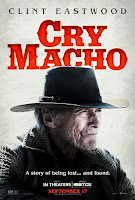As with music, I don't have a lot to say about movies this year. I'm just exhausted by discourse of most kinds at the moment, and I don't really feel like adding to it in this little preamble. It was nice to be able to see movies in theaters again, but also, having a second child now (a good thing!) made going to the theater harder than ever, which made me sad: I would have loved to have seen Malignant or All Light, Everywhere or Pig in a big dark room with strangers. And then there are the theatrical experiences that streaming stole from us: The Power of the Dog, Luca, etc. As much as it deeply grieves me to say so, theatrical distribution seems to be on the way out, an outcome specifically engineered by studios and streaming platforms more so than by audience consent. But as long as theaters are there showing non-MCU movies, I'll be there. Here's to 2022, which will hopefully at least be a better year for movies, if not anything else in this world.
My usual disclaimer that I didn't get a chance to see all movies, including some movies I really wanted to, still applies, of course. Licorice Pizza [ed: since writing this but prior to publishing it, I saw Licorice Pizza, and it definitely would have made my top 5 if I'd felt up to changing my list last-minute], Drive My Car, A Hero, Titane, and many others I simply didn't get to, either because of the usual distribution wankery (why, in this era of digital distribution, we still have to go through the "exclusive to NYC and LA" dog and pony show rollout is beyond me) or because I couldn't get out to the theater in time.
As always, I would love to hear what movies other people enjoyed this year. Movies are best when shared, so share them!
Anyway, on to the list.
Favorite Movies
1. The Power of the Dog
This movie has only grown on me in the weeks since I first saw it. Truly top-tier work from everyone involved. We need more psychological thrillers that are westerns; we need more Benedict Cumberbatch performances that are this good. We need more Jane Campion movies in general.
[Read original review]
2. The Green Knight
Probably the movie I have thought most about this year. It's proven to be a divisive movie among audiences for reasons I can understand (and for some reasons I cannot—the anti-A24 brigade baffles me), but this revisionist take on a required-reading classic is catnip for overthinking English teachers such as yours truly. I yam what I yam.
[Read original review]
3. Benedetta
A fairly rigorous interrogation of church power dynamics and body theology, disguised as nunsploitation. Paul Verhoeven, you sly dog.
[Read original review]
4. The French Dispatch
Wes Anderson going completely ham on his fussy diorama sets and mid-century nostalgia. Maybe not his absolute best (the Frances McDormand character is a weak link, for sure), but it's certainly his absolute most, which is an unqualified good in my mind.
[Read original review]
5. West Side Story
I'm a little sad that this didn't end up finding much of an audience, becoming a pretty resounding flop; makes me wonder what the future is for movies like this. But whatever. At least Spielberg got his musical, and we got a great revival of the classical craft of the form.
[Read original review]
6. Dune
Just an impeccably designed, written, and acted space opera adaptation of a source material I never would have expected to be reproduced so coherently. I've grown increasingly cantankerous about franchise filmmaking as time has gone on, but I'm happy to sit back and enjoy this new franchise.
[Read original review]
7. Old
Silly and profound in equal measures. Mostly I'm just impressed at how much control Shyamalan has over His Thing these days. Dude is making the movies he wants to make, and he's making them well, daring you to like them in spite of (or because of) their idiosyncrasies. Where else in any media would you find a rapper named Midsized Sedan?
[Read original review]
8. Barb and Star Go to Vista Del Mar
Longtime (or probably even shorttime) readers will know that I don't go for modern comedies very often. My sense of humor is just too square/out-of-step with current trends to find a lot of film comedy that funny, and I've made my peace with that. But this, now this is a modern comedy I can get behind. Austin Powers if he were a pair of wholesome midwestern biddies. This movie has occupied more space in my head than any other movie this year.
[Read original review]
9. Malignant
This movie is completely bonkers in all the right ways. Three left turns make a right, and this movie has at least three left turns. James Wan making his career-best film by completely committing to this magnificently absurd little horror gem after having helmed Aquaman is my favorite flex of the year.
[Read original review]
10. maɬni – towards the ocean, towards the shore
A complex rumination on indigenous identity intertwined with an achingly beautiful mood piece about the natural world. If you're scared of the avant-garde, this is a great way to dip your toe in.
[Read original review]
Appendix: Miscellaneous Movies Also Worth Noting
Experimental Documentary Runner-Up: All Light, Everywhere—This was actually my #10 until Malignant bumped it, and it has a certain spiritual kinship with my current #10 in terms of style and status as an unconventional documentary. Like maɬni, this splits the difference between some exquisitely beautiful footage set to a terrific ambient score and a more high-minded essayic treatment of the topic. In All Light, Everywhere's case, it's mass surveillance. It wanders less than maɬni and therefore has less of a capacity for unexpected wonder (hence it not making the top-10 cut), but it's nonetheless stunning and 100% worth your time.
Animation Corner: The Mitchells vs. The Machines—In a strikingly weak year for English-language feature-film animation, it's sort of a backhanded compliment for me to call The Mitchells vs. The Machines my favorite animated film of the year, because truth be told (as it was in my original review), I wasn't in love with the movie. But the animation is tremendous, a genuine step forward for the medium, so I have to give it props for that.
Underrated Animation Corner: Luca—Pixar has gotten itself into a strange kind of bind where if it isn't some swing-for-the-fences ambitious, emotionally fraught film, it's a sign of the studio's retreat into mediocrity. But I thought this was really good, and really good in a solid, modest way that a lot of American animated films struggle to be. Normalize the value of making well-made, low-stakes movies.
Biggest Surprise: Bad Trip—It's well-documented how much I dislike Jackass/Punk'd-style hijinks, so I shouldn't have enjoyed this movie, a gonzo blitz of Jackass/Punk'd-style stunts taped together into a feature-film narrative. But I did enjoy it; a whole lot.
"Stressed Out, But in a Good Way" Award: Shiva Baby—A sublime pileup of dramatic tensions. It would be one of the year's funniest, too, if my heart rate weren't so high.
"Ya Gotta Hand It to Them" Award: Annette—This didn't end up being my cup of tea, but it so completely commits to being the bizarre object that it is that I have nothing but respect for everyone involved.
"Soderbergh's Still Soderberghing" Award: No Sudden Move—After a while, I run out of things to say about Steven Soderbergh, who so consistently delivers films that I enjoy a whole lot but never quite love enough to commemorate in my top 10. His most recent, a pitch-black crime caper starring a murderer's row of performers, is the latest in that line of "great but not quite top 10" material.
"Schrader's Still Schradering" Award: The Card Counter—Not his best by any measure, but Paul Schrader has definitely nailed his "God's lonely man" formula in the sense that he knows how to recycle the tropes over and over again while making little tweaks that help each one feel fresh in its own way. Also, I got an essay on this film published at Fare Forward, so I have a soft spot for this one.
"Making Me Squirm" Award: Red Rocket—I watched a lot of edgy stuff in 2021, but nothing made me more uncomfortable than watching the Simon Rex's character try to prey on Suzanna Son's character. The discomfort is entirely The Point, so I guess good job, Red Rocket.
Best Scene from a Movie Not in the Top 10: Pig—The scene where Cage's character meets a former employee, who has opened a trendy restaurant. It builds from what initially seems like a sad juxtaposition of Cage's isolated, lowly existence with the opulent world he left, only to then pivot to Cage's character gives the most withering dressing down possible of that poor guy, all while implicitly commenting on the devaluing of art and meaning within a capitalist system. Incredible.
Best Kill: Fear Street: 1994—Without a doubt my favorite part of all three Fear Street movies was when that poor girl's head goes through the bread slicer. I know I am a sick man.
Worst Movie of the Year: Fear Street: 1666—Looking back through my reviews for this year, 2021 had a fairly high floor in terms of how much I liked the movies I saw, hence this movie, which I thought was merely "meh" (along with all of the Fear Street movies) being my least-favorite.
Best Non-2021 Movie I Saw for the First Time in 2021: The Rapture—This bizarre, frightening treatise on faith and God basically hasn't left my mind since I saw it back in October, and I probably haven't thought about a single movie this year more than this one, except maybe Noah (because I wrote that gigantic essay on it), which occupies some of the same thematic territory. What can I say: I love movies about spiritual anguish and movies that are weird adaptations of biblical material.


































